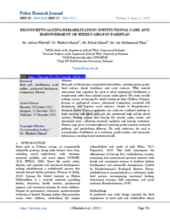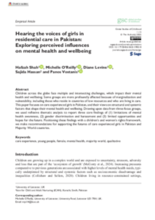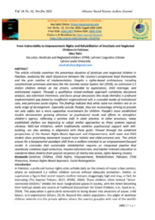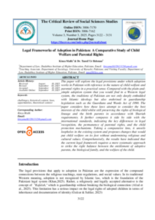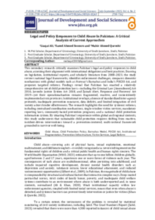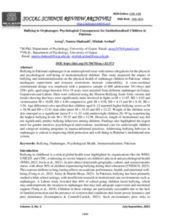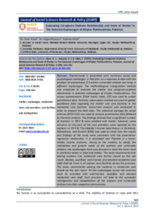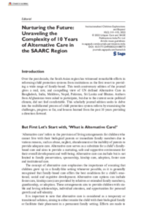Displaying 1 - 10 of 39
The article highlights a deeply troubling crisis facing street-connected children in Pakistan, who remain largely invisible to authorities and are subject to widespread sexual exploitation and abuse, exacerbated by poverty, lack of safe shelter, l
This study examines whether institutional rehabilitation for street girls in Pakistan is genuinely transformative by assessing services at the Zamung Kor Model Institute through a gender- and child-centred lens. While findings show improvements in safety, emotional regulation, and educational engagement, persistent gaps in trauma-informed care, vocational pathways, and post-discharge support highlight the need to reconceptualize rehabilitation as a continuous, community-linked process.
This paper explores the mental health and wellbeing of care-experienced girls in Pakistan, highlighting how structural and systemic factors shape their experiences. Using focus group data, it identifies limited mental health awareness, gender discrimination and harassment, and restricted opportunities as key challenges, and offers recommendations framed within children’s and women’s rights to better support their futures.
This article analyzes the gap between Pakistan’s progressive child protection laws and the harsh realities faced by the country’s 1.5 million destitute and neglected children, highlighting how weak implementation, custodial care models, and social stigma undermine their rights and well-being. It argues that meaningful rehabilitation requires shifting from welfare-based responses to empowerment-focused, holistic support systems that integrate legal protection, trauma-informed care, and market-relevant education.
This paper examines the legal framework governing adoption in Pakistan, highlighting how Islamic principles and the Guardians and Wards Act of 1890 shape the balance between child welfare and parental rights. Through a comparative analysis with international standards, it identifies gaps in the current system and proposes reforms to better protect children’s best interests while respecting cultural and religious values.
This study reviews Pakistan’s legal and policy responses to child abuse, noting that while comprehensive laws exist, enforcement remains fragmented and inconsistent across provinces. It calls for systemic reforms—including centralized coordination, victim-centered services, mandatory reporting, and stronger prevention measures—to move from reactive responses toward a sustainable, multi-sectoral child protection framework.
Bullying in Pakistani orphanages is a serious but understudied issue that threatens children’s physical and psychological well-being. This study surveyed 600 adolescents aged 10–19 from orphanages in Gujrat, Gujranwala, and Lahore to examine the effects of bullying.
This study evaluates the shelter conditions and caregiver–orphan relationships in orphanages in Khyber Pakhtunkhwa, Pakistan, using both quantitative and qualitative methods. Findings indicate that while most orphans are satisfied with basic shelter, their relational and developmental needs are often unmet, highlighting the need for well-trained residential care staff and the recommendation that institutional care be used only as a last resort to support successful reintegration into communities.
In this editorial, Ian Forber-Pratt, editor of this tenth anniversary edition of the Institutionalised Children Explorations and Beyond, gives an of alternative care in Bangladesh, India, Maldives, Nepal, Pakistan, Sri Lanka and Bhutan.
The death of 10-year-old Fatima Furiro would have passed sadly but quietly had it not been for the two graphic videos that turned up on social media. The little girl’s body was this week exhumed for a postmortem examination, days after the videos mysteriously appeared online.

